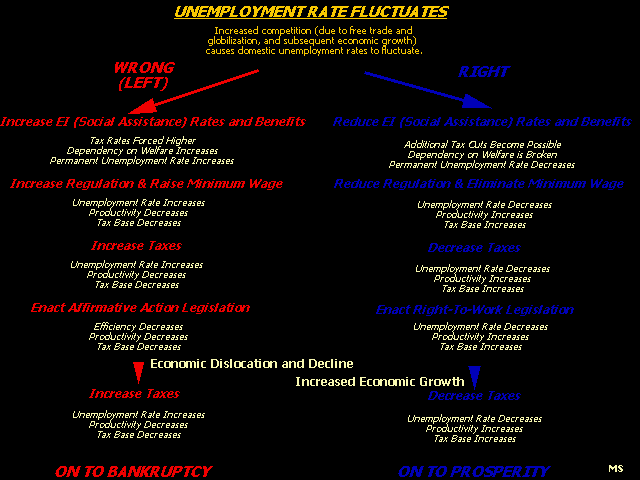 |
Do higher taxes mean lower unemployment? Can employment be subsidized? Is bigger government better for Canadians? |
"The Left is dead. The Rae New Democrats helped kill it, the Chrétien Liberals helped kill it, and the Harris Conservatives helped kill it."
- Hugh Segal
 |
Do higher taxes mean lower unemployment? Can employment be subsidized? Is bigger government better for Canadians? |
Average Canadians know that the answers to all of these questions is no (not including members of the NDP).
Do higher taxes mean lower unemployment?
No, they do not. In the 1997 federal election, NDP leader Alexa McDonough said that her first priority was jobs. She would reduce the unemployment rate and increase taxes at the same time, oblivious to the fact that increasing taxation causes unemployment rates to increase. This is a proven fact, but it was obviously considered irrelevant when the NDP was writing their platform, as the socialist party had no chance of getting elected. And for yet another term, Canada will not see the problems with NDP policy that Ontario saw when Bob Rae was elected premier. Note the link between taxes as a percentage of gross domestic product and the rate of unemployment, as revealed in the following figures compiled by Statistics Canada:
|
The conclusion? Taxes kill jobs. |
The United States taxes less and provides less support to the unemployed than Canada and European nations. The US has also been able to avoid the upward trend in unemployment that has afflicted Canada and Europe. It is perfectly logical to suspect that these facts are related: the generosity of Canada's and Europe's welfare states is responsible for the rise in their unemployment rates.
How might a liberal welfare state create unemployment?
Firstly, taxes and regulations raise the cost to firms of offering jobs, and thus reduce the wages that they are willing to pay. And generous benefits such as employment insurance (EI) reduce the incentive for workers to accept jobs, and thus raise the wages that they demand.
If more capital is taken out of the Canadian economy by the government, the amount of capital that is allocated for employees will decrease, and the unemployment rate will inevitably be pushed higher. This, in turn, will force the government to raise taxes as the cost of EI increases and the economy is approaches a state of dislocation and decline. The negative cycle will continue in this way until the unemployment rate is much higher than it was before the tax levels were raised.

"Instead of high tax rates with low production, government can raise the same amount of revenue through low tax rates that will apply to the high production base that will result from lessening taxes and increasing incentives. . . . Instead of widespread fears about the deficits of the Social Security system, there will be solvency, with funds for the expansion of public and private retirement benefits."1
- Jack Kemp
It is always amusing to hear Alexa McDonough compare the American unemployment rate to Canada's unemployment rate (which is almost twice that of the United States). She asks why Canada's unemployment rate is so high in comparison to the American rate. Well, the answer is simple: The Leftist agenda in Canada, which McDonough herself advocates. American conservative Republicans are responsible for the economic growth and low unemployment rates in the United States. Republicans had the courage to implement the right agenda for their country. Clearly, Ms. McDonough does not have that courage.
Notes:
1Jack Kemp, American Renaissance, (New York: Harper & Row, 1979), 10-11.
Can employment be subsidized?
No. Absolutely not. Any effort to subsidize employment by our government is wrong. The basic question that we must address is: Should Canadians decide how capital is employed, or should our government? Should we decide what is best for us, or should government do that? This is an issue of freedom, and the choice is clear.
Fortunately, the initiative to "subsidize employment" has been nearly destroyed, primarily by the private sector. In the public sector, meanwhile, bureaucrats who once gauged success in terms of numbers of employees are now judged on how many they can shed.
Subsidizing employment doesn't work in the long-term:
Smaller European countries (especially Sweden) have been able to escape economic inequality until the 1990s by subsidizing employment. The key element in Sweden's success was an "active manpower policy," in which the government was prepared to make large outlays in an effort to keep unemployment rates low.
-unemployed workers were sent to expensive retraining programs
-employers were offered substantial subsidies for hiring the long-term unemployed
-government itself acted as an employer of last resort
In 1980, expenditure on such policies was approximately one percent of Sweden's GDP. However, this record of success ended in the 1990s. The Swedish unemployment rate quadrupled from about two percent in 1990 to eight percent in 1996. According to Paul Krugman, Professor of Economics at MIT, "many Swedes attribute the country's slide in economic rankings, from the highest per capita GDP in the OECD in 1970 to rough parity with the UK today, to the long-term incentive effects of its social policies."2
Canadians know that subsidizing employment is not the solution. If any corporation, because of inefficiencies or a lack of demand for their product or service, needs government subsidies to survive, perhaps it should consider reforming itself. If it does not, then we should not reward it with public money, but let it be replaced by a corporation that will be more efficient, more productive, and ultimately, more successful. By deciding what corporations to give subsidies to, government decides what products that we should want and buy, and interferes with a natural process that should be left alone. In the words of Adam Smith, "laissez-faire!"
Additional Reading:
Osborne, David and Ted Gaebler. Reinventing Government: How the Entrepreneurial Spirit is Transforming the Public Sector Reading, Mass.: Addison-Wesley, 1992.
Gingrich, Newt, et al. Restoring the Dream New York: Times Books, 1995.
Notes:
2Paul Krugman, "The Causes of High Unemployment," Policy Options/Options Politiques [Ottawa], July/August 1996, 23.
Is bigger government better for Canadians?
In the 1996 federal election debate, Alexa McDonough announced that "you cannot shrink yourself to prosperity" to defend her position that big government should be maintained, and those who wanted to reduce the size of government and reduce its role were simply wrong. But McDonough was concerned with the prosperity of the federal government and various bureaucratic empires, whose interests she seems to value more than the interests of average Canadians. When she said "you cannot shrink yourself to prosperity," she meant that you cannot shrink the government. So, the Canadian government is more important than the citizens it serves? Wrong.
By eliminating wastes and excesses within government bureaucracies, streamlining certain processes, and generally making the Canadian government more efficient so that it serves Canadians first, rather than itself, we can shrink the government to prosperity. Our prosperity. It is in the public's interest for the government to provide services of the highest quality at the lowest possible cost. Unfortunately, not all MPs recognize this.
In the words of House Republicans, "the overriding economic lesson of the past half century is clear: central planning is a failure. As we move into the next century, the top-down, command-and-control organizational structure is being tossed into the dust bin of history. Central planning didn't work in the Soviet Union, it didn't work in Eastern Europe, and it no longer works in major corporations. And now, with every passing day, it's becoming clearer that bureaucratic central planning is a bankrupt model—financially and intellectually—in Washington, D.C."3
House Republicans wrote that "bureaucracies flourish like bacteria inside the nation's capital. One example is the Bureau of Mines (BOM). In 1911 there were 800,000 miners in the United States. Over the last eighty years mining techniques have become much more efficient; today there are only 200,000 miners. But these efficiency gains have been lost on the folks at the BOM. The agency now has far more employees, 2,000, and spends several times more money, $175 million, than eighty years ago when mining flourished. The truth is that BOM could do its job with one-tenth the budget and the personnel."4
This is true of many government bureaucracies, in both Canada and the United States.
Massive government bureaucracies do not help Canadians solve their problems—they are problems themselves.
Notes:
3Newt Gingrich, et al., Restoring the Dream (New York: Times Books, 1995) 203.
4Ibid., 207.
TRI: Alexa! / smithda@echo-on.net / Last Revised January 1998
"You can walk into a Wal-Mart store today and have your credit card approved in 2.3 seconds. And yet, it takes the Veterans' Department six weeks to answer your letter. We [conservative] Republicans see the efficiency of Wal-Mart and UPS; and we want to change the government to be as courteous, efficient, speedy and effective as those companies. The [liberal] Democrats see those companies, and they want to apply litigation, regulation, and taxation to make sure the companies become more like the government."5
- Newt Gingrich
Notes:
5Newt Gingrich, address, in Proceedings, 478.
Additional Reading:
D'Souza, Dinesh. "Thinking Ahead Conservatively." American Spectator August 1983.
D'Souza, Dinesh. Illiberal Education New York: Free Press, 1991.
Gingrich, Newt, et al. Restoring the Dream New York: Times Books, 1995.
Kemp, Jack. American Renaissance New York: Harper & Row, 1979.
Kristol, Irving. "A Conservative Welfare State." Wall Street Journal 14 June 1993, p. A14.
Kristol, Irving. Memoirs of a Neoconservative New York: Basic Books, 1983.
Krugman, Paul. "The Causes of High Unemployment." Policy Options/Options Politiques July/August 1996.
Niskanen, William. Reaganomics: An Insider's Account of the Policies and the People New York: Oxford University Press, 1988.
Osborne, David and Ted Gaebler. Reinventing Government: How the Entrepreneurial Spirit is Transforming the Public Sector Reading, Mass.: Addison-Wesley, 1992.
Rockwell, Llewellyn. "Lamentations of a Recovering Marxist." Chronicles August 1991, 28.
Watt, James. The Courage of a Conservative New York: Simon & Schuster: 1985.